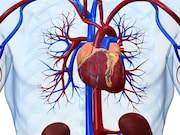In seniors, risk of arterial thromboembolic events peaked in the 30 days immediately before diagnosis
WEDNESDAY, Dec. 26, 2018 (HealthDay News) — In older adults, the risk of arterial thromboembolic events begins to increase 150 days before the date of cancer diagnosis and peaks 30 days before, according to a study published online Dec. 21 in Blood.
Babak B. Navi, M.D., from Weill Cornell Medicine in New York City, and colleagues examined the risk of arterial thromboembolism before cancer diagnosis. A total of 374,331 patients aged ≥67 years with a new primary diagnosis of breast, lung, prostate, colorectal, bladder, uterine, pancreatic, or gastric cancer or non-Hodgkin lymphoma from 2005 to 2013 were identified and matched by demographics and comorbidities to Medicare beneficiaries without cancer.
The researchers found that the 30-day interval risks of arterial thromboembolic events were similar for cancer patients and matched controls from 360 to 151 days before cancer diagnosis. From 150 days to one day before cancer diagnosis, the risks were higher in cancer patients, with a progressive increase as the date of cancer diagnosis approached. During the 30 days immediately preceding cancer diagnosis, the risk peaked, with 0.62 and 0.11 percent of cancer patients and controls, respectively, diagnosed with an arterial thromboembolic event (odds ratio, 5.63).
“We recommend that patients with acute myocardial infarction and ischemic stroke be up-to-date with their age- and gender-appropriate cancer screening, and that their clinicians pay close attention to, and have a low threshold to investigate, any symptoms or signs consistent with occult cancer, such as unexplained anemia or weight loss,” the authors write.
Copyright © 2018 HealthDay. All rights reserved.








